commentary Asia
Commentary: Jokowi’s ban on radical groups and Pancasila’s uncomfortable past
Discomfort over Jokowi’s ban on radical groups in the name of Pancasila arises because it harkens back to the harsher tactics of Suharto's New Order regime, argues Deasy Simandjuntak.
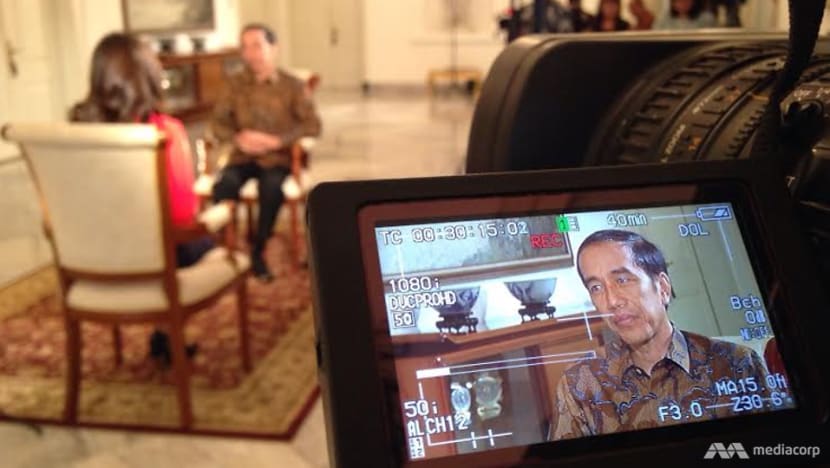
Indonesian President Jokowi prepares for an interview with Channel NewsAsia in 2015.
SINGAPORE: Last week, Indonesian President Joko Widodo signed a decree which allows the Indonesian government to disband groups that oppose Indonesia’s official state ideology Pancasila.
This decree comes two months after the Indonesian government declared an intention to ban Hizbut-Tahrir Indonesia (HTI), a local branch of a radical Islamist organisation that aims to establish a caliphate, and three months after hardline groups launched massive protests against former Indonesian governor Basuki Purnama in a hotly contested gubernatorial election.
On Jul 19, the Indonesian government, citing the new regulation, officially disbanded HTI. The organisation has stated in response that they would appeal this decision in court.
While the new regulation seems intended to curb the growth of hardliners in Indonesia, observers have warned that it potentially muffles a broad range of civil society groups.
Jokowi’s new regulation has also drawn flak from parties all across Indonesia’s political spectrum, from radical Islamist organisations to pro-reform civil society groups.
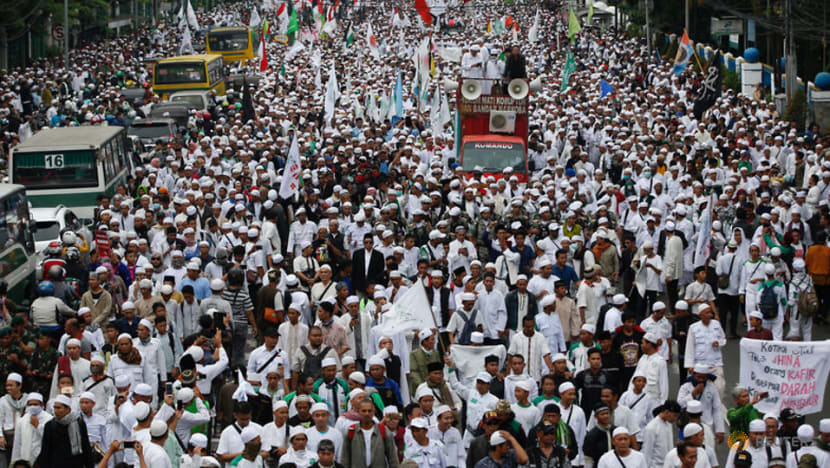
EXPANSION OF POWERS
Through amending Indonesia’s existing 2013 Large Organisations Law, Jokowi’s decree expands the powers of the Indonesian government in dealing with hardline groups in three ways.
First, the decree gives the Indonesian government sole power to assess whether a civil organisation threatens Pancasila and the ability to act against it if so.
The 2013 law highlights that registered civil organisations should not contradict Pancasila and the Constitution but only mentions atheism, communism and Marxism-Leninism as ideologies that contradict Pancasila. The new decree expands this list by including a mention of “other ideologies which aim to challenge Pancasila and the 1945 Constitution”.
Second, the new regulation does away with the need for the Indonesian government to seek court approval to disband an organisation and exhaust all recourse to administrative sanctions.
The 2013 law would have required the Indonesian government to issue multiple warnings, suspend government subsidies and impose a 6-month freeze on the organisation’s activities among other measures, before it can revoke an organisation’s legal status. This revocation would additionally require court approval.
Under the new decree, the Minister for Law and Human Rights is only required to issue one warning against the offending organisation. The minister can subsequently freeze the group’s activities seven days after the warning has been issued, and has the authority to revoke the organisation’s legal status if it does not comply with the suspension order.
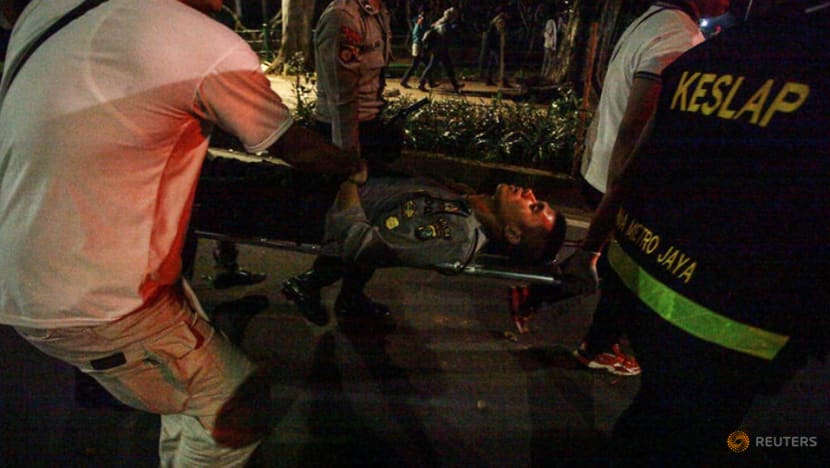
Third, while the 2013 law contains a general provision that members of organisations involved in criminal or civil offences should be prosecuted in accordance with existing laws, the new decree introduces new criminal penalties for members who commit acts of violence, vigilantism, vandalism or hostility.
The new decree also broadly defines acts of hostility as any speech, statement, attitude or aspiration, conveyed either through verbal or written forms, via electronic or non-electronic media, that stirs up hate against a group or a person, including Indonesia’s state administration.
A BREACH OF FREEDOM?
Many pro-reform groups believe that the new decree restricts the freedoms associated with democracy and human rights that Indonesia takes very seriously. The Jakarta Legal Aid Institute has expressed concerns that the new decree gives law enforcement agencies wide-ranging powers, which could be exercised against pro-reform organisations that may be critical of the government, including organisations like itself.
Others, like Indonesia’s National Commission on Human Rights, go further to say that the decree imposes a restriction on the freedom of association and is an illegitimate move that limits the rights of Indonesian citizens.
While there are some who see the decree as a decisive move to counter growing radicalism, these supporters still demand that the regulation’s application be made transparent, accountable and show strong proof that the organisation to be disbanded pose a threat to Pancasila.
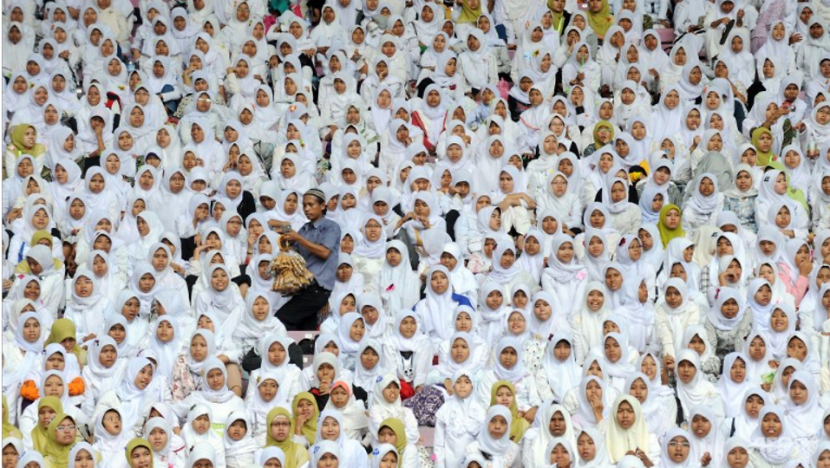
Although any decision to disband a group can be challenged in court, the vast majority of observers also point out that Jokowi’s decree has removed many important checks-and-balances that have been in place since Indonesia chose the path of democracy.
PANCASILA'S PAST
The concerns raised about the new regulation reflect an underlying anxiety that the Indonesian government is resorting to strategies similar to those of Suharto’s New Order regime.
In 1966, Major-General Suharto, empowered with an order previously issued by President Sukarno that gave him extraordinary powers to guarantee Indonesia’s security during a state of national emergency, eradicated the Indonesian Communist Party (PKI) and its wing organisations. He did so under the pretext of protecting the country’s ideology of Pancasila, following allegations that the PKI had staged a failed coup.
The disbandment also led to a political purge of individuals and groups sympathetic to PKI, whose were also deemed to be enemies of Pancasila.
Pancasila later became synonymous with the New Order regime, and was extensively used to legitimise its policies. In 1978, the Suharto government introduced a compulsory Pancasila education programme for civil servants, and later students.
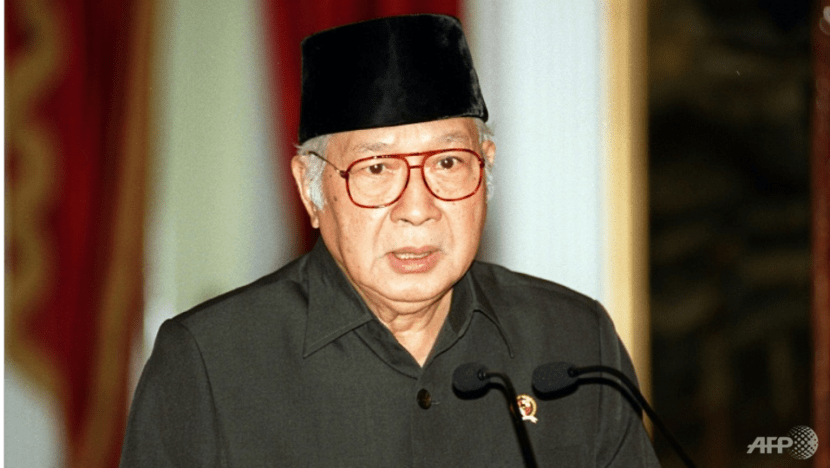
Suharto also used Pancasila as a tool to suppress political dissent. In 1985, the Suharto government issued a law obliging all organisations and political parties to adopt Pancasila as their sole ideology, as a way to curb the growing political influence of Islamic groups.
Naturally, resistance came from these same religious Islamic groups, such as the Islamic Students Association and the Indonesian Islamic Students. The latter was consequently disbanded.
Even as late as 1996, the Suharto government disbanded the Democratic People’s Party, a small pro-labour political party, on accusations that the group had planned a riot and attempted to revive the PKI.
DEALING WITH RADICAL GROUPS
Given Indonesia’s troubling history where the principle of Pancasila had been applied to dismantle groups that oppose the Suharto government, it behoves us to rethink whether giving the Indonesian government extraordinary powers to ban radical groups now is a good idea.
For one, the trouble is that radical, intolerant groups, which appear to be the primary targets of the decree, can paint themselves as victim to score sympathy points. They also oddly find common cause with liberal reform groups who would have otherwise been strong allies of the Indonesian government’s efforts to stamp out intolerance.
Furthermore, disbanding these groups would not likely put a stop to their activities, as it would only serve to drive them underground, where away from the glare of public scrutiny and through more clandestine means, they can continue to pursue their fiery brand of intolerance and intimidation.
The Indonesian government is walking on thin ice as it navigates between the need for stability and security on the one hand, and its democratic commitment to ensuring political freedom for all Indonesians on the other.
The rise of intolerance does call for stronger government intervention in curbing the growth of hardline groups. However, the question remains whether an expansion of powers that gives the Indonesian government close to unfettered discretion to define which groups to sanction is the best way forward.
Deasy Simandjuntak is a visiting research fellow at the ISEAS-Yusof Ishak Institute.












